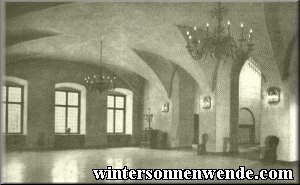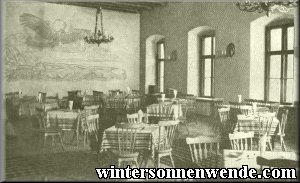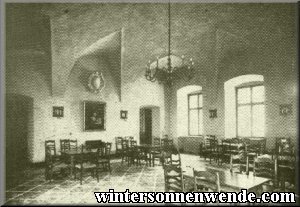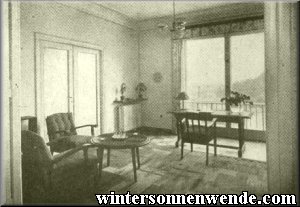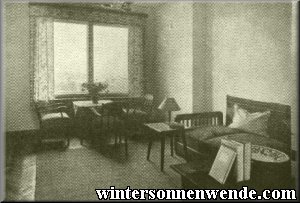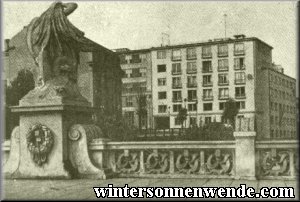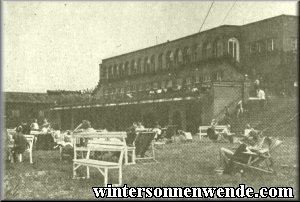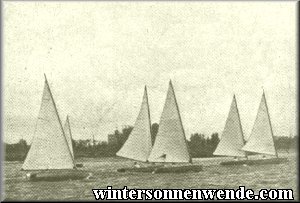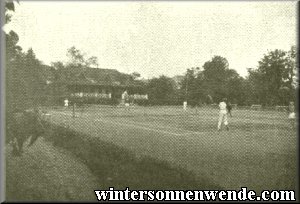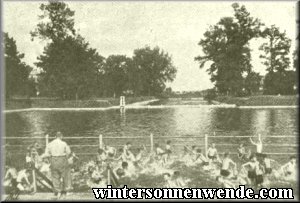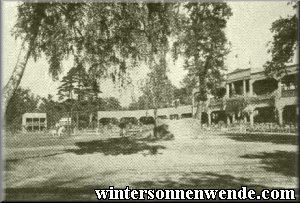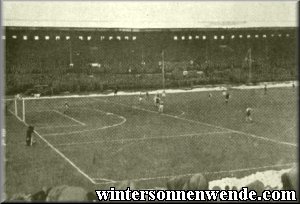 |
 Personnel Care and the Organization of Leisure Time For the Germans from the Reich working in the General Government, care in the truest sense of the word is absolutely required, since all of them, being removed from their home and their families, are exposed to especial hazards and also to much unpleasantness in their everyday life. It was therefore the aim of the German administration to create a common focus for the Germans living in the District of Warsaw, and to provide them with favorable living conditions and intellectual stimulation.
Besides several guest rooms, the side wings of the German House contain a number of tastefully and sensibly furnished apartments for personnel members who prefer not to set up their own housekeeping. Many residences in the German Quarter have been furnished according to German tastes, and have been provided with furniture, curtains and bedding. It is now only rarely necessary for personnel to live in inadequate hotel rooms. The most important measure in terms of accommodations has been the renovation of two large personnel residences, consisting of more than 150 rooms furnished in unpretentious German style. These facilities result in small shared apartments where everyone has their own comfortable room to live and sleep in, and often also a cozy shared common room to use at will. This arrangement is extremely popular and has proven to be very practical. The creation of such residences was even more necessary in the smaller cities and towns, where the County Administrators have managed to provide their personnel with, in some cases, downright exemplary facilities despite the primitive conditions they were initially faced with. But many other things besides the provision of accommodations and meals have also been necessary: for example, the establishment of German stores featuring reasonable prices, the creation of a health care facility to make up for the lack of home-care, clothing and shoe repair collection centers right in the offices, the accommodation of special diets and the provision of sun-ray treatments, the establishment of dressmakers' facilities where every female employee can sew her own clothes, and the provision of a convalescent home in pleasant surroundings. Even a German streetcar line had to be arranged to prevent overly close contact between the Germans and the Polish population. But the creation of appropriate living conditions is only the beginning of overall personnel care. It is further necessary to provide intellectual stimulation so as to maintain the mental acuity and physical strength of the Germans at peak efficiency for the daily stress of working in an ethnically alien environment. As detailed in Section XIII, the Division of Propaganda, working together with the Party, has handled this great responsibility admirably. Sports take up a large portion of the personnel's leisure time. Much has been done for the physical conditioning of the Germans during these years of reconstruction, and facilities created for the practice of various kinds of sports include the Club House on the Vistula, which offers opportunities for sailing, rowing and canoeing activities; Agricola Park, with its new swimming pool, aesthetically arranged tennis courts, and sports facilities for track and field activities and target shooting; even an indoor swimming pool for wintertime sports at the YMCA; and not least of all the Equestrian Club, which is particularly popular. In spite of numerous difficulties it has been possible to conduct repeated field-trips, sight-seeing tours or boating excursion on the Vistula, and thus to afford the personnel of the General Government a glimpse of the countryside and everyday life, and of the ancient German cultural history of the Vistula region.
Many a bright and cheerful social get-together, Christmas celebrations full of spirit, and children's parties, have contributed to turn these Germans, drawn from all parts of the Reich, into a
close-knit, united community. |





